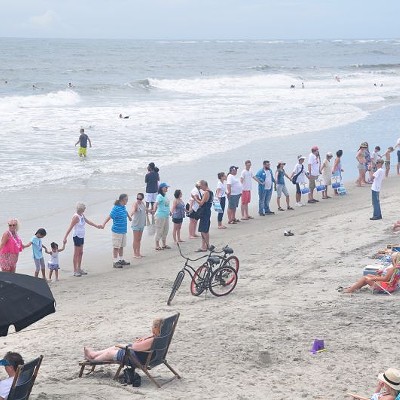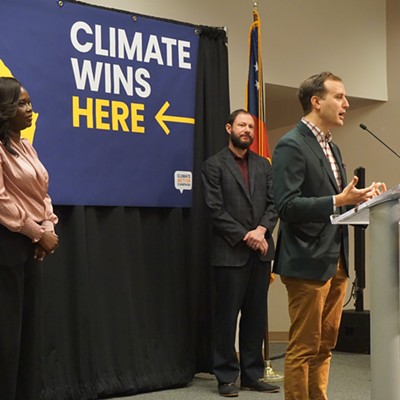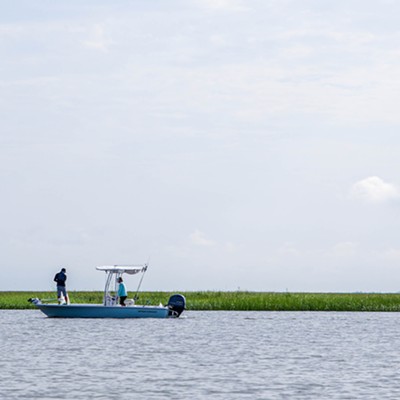LIKE MANY coastal Georgians, I was disturbed to learn that our Congressional representative, Buddy Carter, has reversed his pledge to stand against offshore drilling along our coast.
After saying he would uphold the position taken by the General Assembly in an official resolution opposing it, Carter then contradicted that promise by casting votes supporting the environmentally hazardous activities.
Many are perplexed that Rep. Carter would betray his constituents by defying their clearly stated desire to protect Georgia’s ocean shores, tourism, quality-of-life and fisheries from the destruction of oil spills.
The congressman claims that his position has been consistent, because the measures on which he voted did not allow exemptions for one or another state, so he unconditionally supported exploring and developing U.S. offshore energy supplies.
But, especially in light of Rep. Carter’s membership on the esteemed House Select Committee on the Climate Crisis, this position is indefensible because long-endorsed scientific evidence overwhelmingly concludes that this crisis is primarily caused by the combustion of fossil fuels, which is a major source of heat-trapping greenhouse gases (GHGs).
Despite that, Carter continues to state his conviction that all energy options “should be on the table.”
Similarly, Carter’s participation in a June fund-raiser for him at the Capitol Hill Club, promoted as an “Oil & Gas Breakfast,” suggests a troubling conflict of interests that conspicuously violates his pledge to coastal Georgians.
The timing of that ill-considered event is also noteworthy, since it occurred soon before his controversial votes were cast in support of offshore oil exploration.
Even the congressman’s attempt to justify his offshore-drilling votes seems fundamentally flawed by compromised motives, indicating either extremely poor judgment, woefully deficient understanding, or outright deception.
According to press reports, Carter said he wants to allow offshore exploration and drilling everywhere in the Atlantic except along Georgia’s coast.
Yet, spills from operations in areas adjacent to South Carolina or Florida could readily contaminate coastal Georgia when sludge is transported by ocean currents.
Carter’s simplistic belief that our interests can be protected merely by exempting drilling areas off of Georgia’s coast reveals his fundamental ignorance of the functions and importance of complex marine ecosystems, not to mention our region’s dependent on them for recreational and commercial activities, quality of life, and protections provided by healthy tidal marshes that are vitally linked to the marine environment.
Moreover, contamination and degradation of national marine resources by fossil-fuels – related to exploration, drilling, and GHG-emitting combustion – is a fundamental danger to both U.S. food supplies and coastal economic interests. Yet Carter seems to be unaware of, or defiant about, these realities.
Another realm of the congressman’s malfeasance and perplexing negligence has direct relevance to the importance of U.S. military operations in Georgia’s coastal district. Since 2003 the U.S. Department of Defense has advised federal officials, including the president, about serious threats to America’s national security posed by climate change.
The apparent absence of this fundamentally important reality in Carter’s thinking is especially troubling because the Pentagon has included climate-change impacts in defense planning for many years. DoD has repeatedly reported that the impacts of climate change are likely to increase the frequency, scale, and complexity of future missions.
Rather than acknowledging this overwhelming evidence by calling for actions to protect our military capabilities and national interest by reducing greenhouse-gas emissions, Rep. Carter has been conspicuously silent about such factors in relation to the missions, budgets, and strategic readiness of Fort Stewart and Hunter Army Airfield.
In fact, Carter’s vacillating opinion about the need to address human activities as the cause of climate disruption – despite compelling scientific proof and widely validated concerns – further substantiates serious doubts about the congressman’s comprehension and/or motives.
Another disconcerting example indicating Carter’s incompetency or politically compromised motives is his woefully misleading report about a recent tour of U.S. immigration facilities along the Mexican border, which depicted those detention centers in glowing terms – directly contradicting official evaluation by federal officials and numerous well-documented news reports.
Rep. Carter seems to be blithely unaware that the Inspector General of Homeland Security has issued a scathing report condemning those same facilities for unsanitary, deplorable conditions that violate basic, internationally-recognized human rights, that were – until now – exalted by the U.S.
In general, for whatever reasons, Congressman Carter seems to be disturbingly incapable of objective observations, clear thinking, and analytical accuracy.
Not only is Carter’s competency in question, but these examples of his faulty performance cast grave doubt on his ability to exercise – and reliably act upon – independent judgment, beyond the reach of the dominant influence of his party’s dictates as well as related fossil-fuel industry and other corporate interests, whose campaign contributions are notoriously extravagant.
Accordingly, coastal Georgians are justifiably troubled because evidence strongly suggests that Rep. Carter’s ability to understand and dependably serve the public interest is seriously impaired.


























